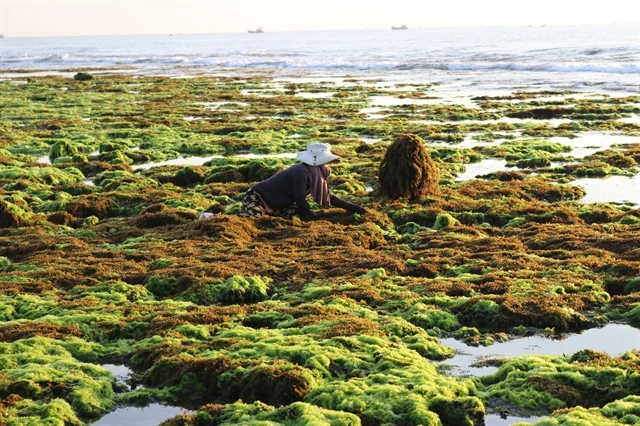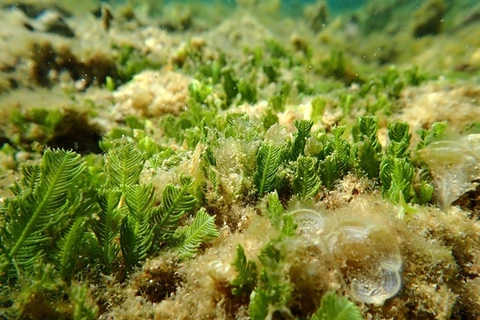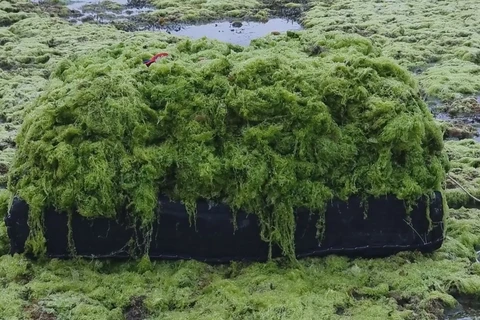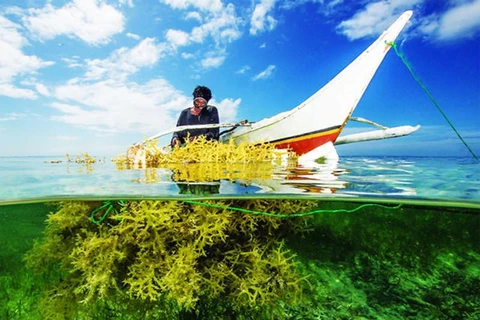
Hanoi (VNS/VNA) - Just as the forestry sector has tapped into the carbon credit market, the aquaculture sector, particularly seaweed farming, is emerging as a promising avenue with the potential to store up to 1,500 tonnes of greenhouse gas per square kilometre.
Vietnam has identified 800 species of seaweed, of which 90 have economic value. Currently, the country has large-scale seaweed farming areas, which are often integrated with other seafood and marine products like oysters, pearls and abalones.
Dinh Xuan Lap, Deputy Director of the International Collaborating Centre for Aquaculture and Fisheries Sustainability (ICAFIS) under the Vietnam Fisheries Society, said that both domestic and international scientists had proven that seaweed can absorb CO2 two to five times more effectively than forests of the same area.
Some species, including kelp with broad fronds, can absorb CO2 up to 20 times more efficiently than trees. Expanding seaweed farming will therefore create massive carbon storage capability for the seafood industry.
“We are collaborating with businesses to develop the Blue Ocean-Blue Foods programme to grow Vietnam’s seaweed areas, turning them into CO2 absorption reservoirs,” Lap said.
The goal is to develop large-scale seaweed farming to mitigate the effects of climate change, reduce greenhouse gas emissions, improve the marine environment and enhance community livelihoods.
Meanwhile, companies are now producing biodegradable plastic cups from seaweed. Vietnam’s seaweed also has an advantage in pharmaceuticals compared to countries like Japan and the Republic of Korea.
"Seaweed from Vietnam can be processed into various compounds used in dentistry or the food industry, such as in dairy products to create thickness and blend in milk. The extract yields are much higher than those from seaweed we tested from Japan and the Republic of Korea," said Nguyen Thi Sam, CEO of Wineco Vietnam JSC.
Moreover, after being processed for cosmetics and pharmaceuticals, the residue from some seaweed species can be used as animal feed, helping to reduce methane emissions from livestock.
The agricultural sector has identified seaweed as a green resource that helps clean the seas and the atmosphere while providing a good income for farmers, given the relatively low investment costs.
In large seafood farming areas, including Quang Ninh, Khanh Hoa, Ninh Thuan and Kien Giang, seaweed farmers can earn billions of Vietnamese dong annually, providing a livelihood that helps many households escape poverty.
According to a report by the Directorate of Fisheries under the Ministry of Agriculture and Rural Development, Vietnam’s potential seaweed farming area could reach around one million hectares, yielding 600,000 to 700,000 tonnes of dry seaweed annually.
Currently, Vietnam’s seaweed production stands at around 150,000 tonnes per year.
Tran Dinh Luan, Director of the Directorate of Fisheries, believed that once seaweed farming reaches a certain scale, Vietnam will collaborate with international organisations to enable seaweed farmers to sell carbon credits.
“Globally, carbon credits from seaweed farms have already been discussed. In Vietnam, selling carbon credits from seaweed is also very feasible,” he said.
With countries committing to reducing greenhouse gas emissions, carbon credits represent a highly promising market, expected to reach up to 100 billion USD by 2030.
In Vietnam, forest carbon credits have already been successfully transferred at 5 USD per credit. The World Bank has committed to paying 10 USD per credit for rice carbon credits. Meanwhile, some international organisations have expressed interest in purchasing carbon credits at prices of 20-30 USD per credit.
According to the latest draft of the Carbon Market Development Scheme in Vietnam, from 2025-2028, the carbon market will be piloted nationwide. From 2029 onwards, the market will be officially operational nationwide.
By expanding seaweed cultivation to its full potential of around one million hectares, the aquaculture sector can unlock a vast source of blue carbon credits. Once the carbon market is operational, seaweed carbon reservoirs will become a new resource, helping Vietnamese fishermen increase their income./.






















